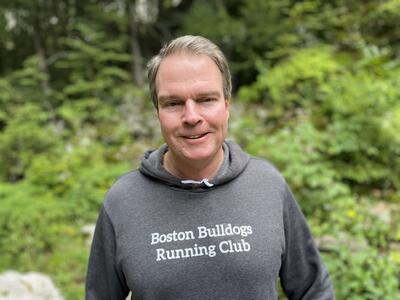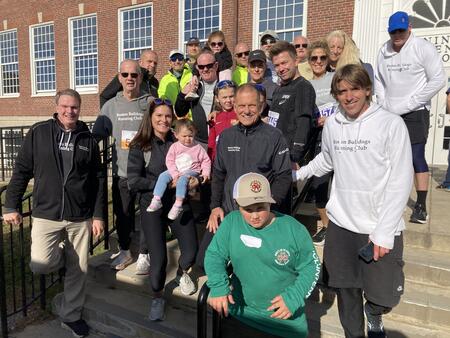By Timothy Cahill ’16 M.A.R.
Any Saturday morning you can see the runners gathering at Cleveland Circle in Boston for their weekly group run along the tree-lined loop of the Chestnut Hill Reservoir. To the casual eye, the people in their bright togs and running shoes might look like just another gaggle of fitness-forward souls who take pleasure in pushing their bodies and minds to higher levels of endurance. But to Jim Keane ’91 M.Div., this scene, and others like it sponsored by the Boston Bulldogs Running Club, are pictures of grace in action.
“It’s church by another name,” says the Yale Divinity School alum and newly named executive director of the Boston Bulldogs.
 Directing an athletic association might seem a strange place for a school administrator and Ph.D. in liberation theology to cap off a career, but the Bulldogs are far from a run-of-the-mill runners club. They are, rather, an innovative peer-to-peer collective of recovering drug and alcohol abusers and their allies, who use the fellowship of the road to provide support and solidarity to others like themselves. The club was founded in 2015 by social worker and recovered heroin addict Mike Ferrulo, who in the 1970s had used long-distance running as part of his own rehab regimen. Ferrulo believed the courage and tenacity that running had instilled in him could help others on their own hard path to sobriety.
Directing an athletic association might seem a strange place for a school administrator and Ph.D. in liberation theology to cap off a career, but the Bulldogs are far from a run-of-the-mill runners club. They are, rather, an innovative peer-to-peer collective of recovering drug and alcohol abusers and their allies, who use the fellowship of the road to provide support and solidarity to others like themselves. The club was founded in 2015 by social worker and recovered heroin addict Mike Ferrulo, who in the 1970s had used long-distance running as part of his own rehab regimen. Ferrulo believed the courage and tenacity that running had instilled in him could help others on their own hard path to sobriety.
For Keane, helping the club thrive at a time when it seeks to expand to other cities feels like the culmination of more than four decades of higher education, professional experience, and service to others.
A formative episode in his childhood put him on a path committed to social justice and compassion. Keane grew up in the Boston suburb of Needham, Mass. as one of eleven children in a devout Irish Catholic family. Two of his uncles were priests, and his father served on the parish council. At Mass one Sunday, the priest used his homily to denounce racial integration and exhort parishioners not to sell their homes to Black families. As a small boy fidgeting with his brothers and sisters, Keane remembers nothing of the sermon, but what happened next remains a vivid memory.
“My dad, who was sitting at one end of the pew separated from his wife by eleven kids, nodded at my mother and we all stood up and walked out.”
For Keane, his parents’ sense of good and evil that day became a touchstone of his awareness. As an undergraduate at Iona College, he helped establish a soup kitchen in New Rochelle, N.Y., that exists to this day. After graduation, inspired by the liberation theology of Dominican priest Gustavo Gutiérrez, he visited Peru and the shanty-town pueblos jóvenes outside Lima. For his Master of Divinity degree at YDS, he studied with pioneering feminist theologian Letty Russell and postliberal ecumenist George Lindbeck. His Ph.D. dissertation at Marquette University examined Gutiérrez’s theory of solidarity with the poor through the lens of German Catholic theologian Karl Rahner.
Most of Keane’s career was spent in secondary education, as a teacher and principal in Catholic high schools in Harlem, Boston, and Hartford, Conn. From 2015 to 2021, he served on the YDS Alumni Board, and is currently a delegate to the Yale University Board of Directors. His impressive resume informs his transition to the Bulldogs and the world of addiction recovery and wellness. But another part of his life, one that will end up on no CV, is equally relevant.
“I have a recovery story, too,” he says. While declining to go into detail, Keane allows that an addictive personality and struggle with alcohol and painkillers eventually led him into rehab, AA, and toward a life of sobriety. The experience left him with a deeper understanding of the suffering and strength of those he meets through the Bulldogs.
“There is a powerful sense of connection and community in the club that comes from us all sharing the same kind of pain,” he observed. “Newcomers just seem to ‘know that you know,’ and it changes everything.”
Keane spoke with me by telephone last month about the work of the Bulldogs, the connection between running and recovery, and the spiritual dimension of his work. The exchange below is excerpted from that conversation. It has been edited for length and clarity.
Timothy Cahill: What exactly is the work of the Boston Bulldogs Running Club?=
Jim Keane: We support people in recovery by offering five different runs around the Boston area every week. We also field a marathon team each year. We’ll have 15 runners participate in the Boston Marathon this year, and we’ll participate in other organized runs as well. We also “give back” and do direct outreach and advocacy on behalf of those feeling the harsh effects of addiction.
Who can become a member of the club?
 Some of our members are fresh out of rehab but a good number are buckling-down for long-term recovery. We’re about what happens after rehab. What happens after your first 90 days of sobriety? How do you make this long haul? Most of our members are involved in Alcoholics Anonymous or Narcotics Anonymous, and we don’t want to compete with that. What we are is another important tool in the recovery toolbox. Also, about 15 percent of our members are people who are allies—healthcare workers, people who work with addicts, family members.
Some of our members are fresh out of rehab but a good number are buckling-down for long-term recovery. We’re about what happens after rehab. What happens after your first 90 days of sobriety? How do you make this long haul? Most of our members are involved in Alcoholics Anonymous or Narcotics Anonymous, and we don’t want to compete with that. What we are is another important tool in the recovery toolbox. Also, about 15 percent of our members are people who are allies—healthcare workers, people who work with addicts, family members.
You are a runner yourself, having completed three Boston marathons and other shorter races. What is the specific relationship of running to recovery?
It’s hard to give something up without replacing it with something else. Running and wellness are really good replacements. Endorphins are real. There really is such a thing as a runner’s high, and it’s therapeutic. It also replaces—look, if you are a former drinker or a drug addict, you now have a lot of time on your hands. What will you do with that? That’s something people don’t talk about. They’ll tell recovery stories—I was lost and then I was found; everything was awful and now it’s great. But that’s really just the highlight reel of recovery. What’s on the cutting-room floor is all the difficult parts, the things people don’t look at. Running provides a focus, a goal, it teaches discipline, and it also gives you something to do. Conquering addiction requires physical and mental toughness. That’s what a Bulldog is!
What did you mean the other day when you called your work “church by another name?” How does the job connect to your spiritual life?
Those who are in AA will tell you there’s spirituality there, and it’s the same thing with the Bulldogs. You might not use Christian, Jewish or Buddhist words to explain it, but there’s an incredible spiritual element to all this.
You told me that when you were in addiction recovery you completed the Spiritual Exercises, the series of Christian meditations and prayers devised by Ignatius of Loyola to help participants discern the will of God in their lives. How did that affect you?
The Spiritual Exercises changed my whole understanding of God. Despite all my theological education, I didn’t really understand God as a personal, dynamic presence until I went through recovery and the Exercises. Through them, I came to the idea that this kind of work is exactly what I should be moving into.
All we do, everything we do, is God’s work. I certainly felt that way working in schools, and I don’t want to detract from any of that. But somehow, what I’m doing now seems so much more immediate. My brother asked me the other day what it’s like working for the Bulldogs, and I told him that now I measure every day by the number of times that I weep.
Wow. What did you mean?
Because it’s so inspiring! And it’s not just the incredible stories you hear every day. Some young addict tells you about how he and his family can now believe in his future, or a dad gives money because his daughter died and he wants others to have the hope that she never had. I’ll put it this way. The other day my spiritual director asked if I believe in resurrection. I said of course I believe in it, because I see it every day with the Bulldogs. It’s happening on the streets and the roads and the running paths of Boston. These people were lost. Some were given up for dead. And now, the change is so dramatic. That’s resurrection. That’s why this is so powerful. The Bulldogs exemplify the powerful capacity of human beings to change.
The idea of resurrection, the epitome of which is the cross, is that through suffering we transform. Christianity’s message is that suffering can either break you or break you open. And what I’m seeing, what’s making me weep every day, is the number of times I see people broken open, transformed by suffering, and becoming the best versions of themselves.
Usually, the work of an executive director involves a lot of planning, management, fundraising, that sort of thing. But it sounds to me like you also have a more direct role that’s almost pastoral in nature. What’s that like?
When we do runs, I walk. I had hip surgery years ago, which is part of the self-medication involved in my addiction. That means when people show up to our runs who are new and have never run before, the only thing they might be able to do is walk, and that’s why I get to know them. There’s something about that part of the job, it’s almost like being a parish priest. It has put me in situations of real privilege, to be with people in their weakest moments, which can become their greatest moments.